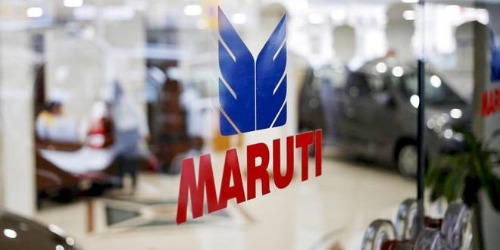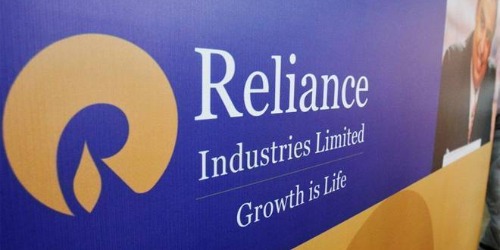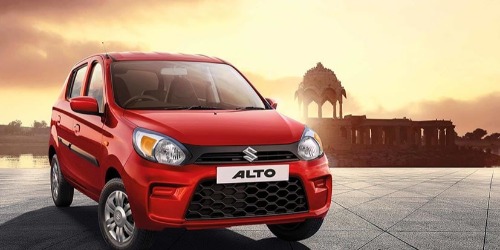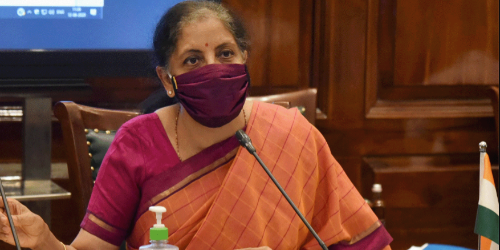Maruti reports 54% YoY decline in sales in June; sells less than 40% of pre-coronavirus level

India's largest carmaker Maruti Suzuki reported a 54 percent decline in sale of passenger vehicles in the domestic market in June at just 51,274 units. June was the first full month since the lockdown restrictions were eased in the middle of May but the company's tally was less than 40 percent of its pre-Covid19 levels of February.
The company registered a 44 percent decline in sales at 10,458 units in the mini car category that comprises cars like Alto and S Presso, while its most voluminous compact segment consisting of brands like the Wagon R, Swift, Celerio, Ignis, Baleno and Dzire registered an over 57 percent drop at 26,696 units. In the mid size sedan segment (Ciaz) the decline was the steepest at 76.2 percent with sales of just 553 units. Utility vehicles saw a 45 percent drop at 9,764 units, while vans registered a 59 percent decline at 3,803 units.
Contrary to expectations, the numbers are significantly lower than the levels the company was operating at in February when it had sold 133,702 units. During the course of June, several companies had said they hoped to recover upto 60-70 percent of pre-Covid era sales during the month. The company has said nearly 90 percent of its 3,087 dealerships are now open across the country. "There is way too much uncertainty to predict when we will get back to normal levels. The definition of normal itself may need to be revised," company chairman R C Bhargava had said last month.
Analysts have predicted companies like Maruti and Hyundai that have higher penetration in rural markets and a sizeable portfolio of cars at the low end entry level segments may stand to gain in the post-Covid era as consumers may shift from public transport to private usage on concerns of health. Bhargava has however said it is too early to judge whether there has been any such impact yet.
"We also have to take into account job losses and salary cuts. Consumers may be less inclined to purchase big ticket items," he had said. Others have not fared any better either. Toyota Kirloskar Motor reported a 63.5 percent decline in sales last month at 3,866 units, which was also around 37.3 percent of its pre-Covid sales tally of February 2020.
"With demand gradually coming back in the market and with strong support from our dealer partners as well as the hard work of our SBUs (Strategic Business Units), we have been able to keep up with customer expectations. Thanks to our special financing offers and buy back offers which has also helped bring customers back to dealerships. Our retails (sales from dealers to customers) is nearly double of wholesales (sales from TKM to dealers) second month in a row thereby bringing down our dealers inventory carrying cost by more than 50 percent over the past two months. We are also seeing a visible growth in online enquiries as well as bookings," said Naveen Soni, Sr. Vice President, Sales & Service, TKM.
"Post COVID the market has been showing a shift towards entry level suffix in all products that we sell and we are monitoring such trends and adjusting our future production according to market demand based on Toyota Pull System which supplies vehicles to dealers when it is required, where it is required and how much is required. Our production side has been helping us ramp production to be able to meet customer requirements. Going forward, we would like to focus on ramping up production while placing the highest priority to the safety and well-being of all stakeholders and by adopting the 'Safety and Health First' approach at all times."
MG Motor that is owned by China's largest automaker SAIC and sells the Hector SUV in the country reported sales of 2,012 units last month. The brand debuted in India in the fag end of June 2019, so a comparison to last year is not valid. As the sole Chinese firm in the country, MG, however, may be at the receiving end of the ongoing campaign to boycott Chinese products in the country. A number of its customers have already posted their cancellation orders on social media in the last fortnight. MG was also one of the first companies in India to be face disruption due to supply chain issues as a result of the coronavirus pandemic in China at the start of this year. The company said it continues to face headwinds on supply chain and logistics issues.
"Even though our sales performance in June 2020 was better than May this year, we continue to face headwinds in supply chain and logistics due to multiple issues," said Rakesh Sidana, Director - Sales, MG Motor India. "Our teams are doing their best to overcome these challenges and we are looking forward to the launch of the Hector Plus in July 2020."
- 0
- Leave a comment
Jio's golden touch makes Reliance Industries share rise 108% in 3 months

Mukesh Ambani-led Reliance Industries' stock has seen a tremendous rally in the past few months. The stock has risen 108 per cent from its 52-week low of Rs 867.82 touched on March 23 to Rs 1,804.10 on the Bombay Stock Exchange (BSE). Benchmark S&P BSE Sensex has risen 35 per cent during the same period.
Shares of Reliance Industries Ltd (RIL) continued gaining momentum on Monday, rising as much as 2.41 per cent to hit a fresh all-time high of Rs 1,804.10. The rise can be attributed to the company's announcement last week that it had become net debt-free ahead of its March 2021 deadline. On the National Stock Exchange, it rose by 2.54 per cent to an all-time high of Rs 1,804.20. The RIL share price has gained over 12 per cent in the last three trading sessions.
Driven by strong rally in recent past, the market capitalisation of Reliance Industries touched $150 billion on Monday. In the early deals, RIL's valuation zoomed Rs 28,248.97 crore to Rs 11,43,667 crore ($150 billion) on the BSE.
The RIL on Friday became the first Indian company to cross the Rs 11 lakh crore market valuation mark as its stock rallied over 6 per cent after chairman Mukesh Ambani announced that his flagship company had become net debt-free.
"I have fulfilled my promise to the shareholders by making Reliance net debt-free much before our original schedule of 31st March 2021," Ambani said in a press release issued by RIL on Friday. He had initially announced plans to make RIL debt-free on August 12, 2019, at the 42nd AGM of the company.
RIL raised a total of Rs 1,68,818 crore in just 58 days via a rights issue and by roping in global tech investors to buy minority stake in Jio Platforms Limited, the company announced on Friday. The company has raised Rs 53,124.20 crore via the mega rights issues, while its Jio Platforms raised Rs 1,15,693 crore through investments made by leading global investors.
If the strategic stake sale to BP in the petro-retail joint venture is counted, the total funds raised stand at Rs 1.75 lakh crore. RIL's net-debt as on 31st March 2020 was Rs 161,035 crore.
Jio Platforms has raised Rs 1,15,693.95 crore from leading global investors including Facebook, Silver Lake,Vista Equity Partners, General Atlantic, KKR, Mubadala, ADIA, TPG, L Catterton and PIF since April 22. PIF's investment marks the end of Jio Platforms' current phase of induction of financial partners, the company has stated.
Maruti Suzuki's Alto becomes India's top-selling car for 16th year in a row

Maruti Suzuki India on Monday announced that their entry-level car Alto has become the best-selling vehicle in its range for the16th year in a row. The country's largest car manufacturers sold around 1.48 lakh Altos in 2019-20.
Alto was launched all the way back in September 2000. It became India's bestselling car in 2004 and has not been dethroned since, according to a company statement.
Maruti Suzuki India Executive Director for Marketing and Sales Shashank Srivastava has said that the strong consumer base of Alto is an example of customers appreciating timely upgrades and refreshments in the brand.
"Maruti Suzuki has kept a close eye on the evolving customer preferences and aligned its product range to such changes," he added.
Following the latest government BS6 emission regulations, the current generation Alto comes with standard safety features including driver-side airbag, anti-lock braking system and electronic brake-force distribution. It also has reverse parking sensors and a high-speed alert system. Alto 2019 was Maruti's first entry-level car to meet the BS6 emission regulation.
According to the company, the current Alto complies with the latest crash and pedestrian safety regulations. The Alto offers a claimed fuel efficiency of 22.05 km/l for Petrol and 31.56 km/kg for CNG.
GST Council meet: No fee for late filing of GST returns for firms with zero liability

Finance Minister Nirmala Sitharaman-led Goods and Service Tax (GST) Council on Friday decided that no late fee would be levied for delayed filing of GST returns by registered entities with no liability between July 2017 to January 2020. In its 40th meeting, the Council also decided that maximum late fee was capped at Rs 500 per return if there is any tax liability.
GST Council members discussed several issues via the over one-hour video conferencing meeting for the first time post the COVID-19 lockdown. "The reduced rate of the late fee would apply for all the GSTR-3B returns furnished between 01.07.2020 to 30.09.2020," a government statement said.
For small taxpayers with aggregate turnover up to Rs 5 crore for February, March and April, the rate of interest for late furnishing of return for the said months beyond specified dates (staggered up to July 6) has also been reduced from 18 per cent per annum to 9 per cent per annum till September 30, the council said.
Small taxpayers will not be charged any interest till July 6, and 9 per cent till September 30 thereafter, the council said.
In wake of COVID-19 pandemic, for taxpayers having aggregate turnover up to Rs 5 crore, the council decided to waive off late fees and interest if the returns in FORM GSTR-3B for the supplies effected in May, June and July are furnished by September. To facilitate taxpayers, who could not get their cancelled GST registrations restored in time, the Council said they could apply for revocation up to September 30 if registrations have been cancelled till June 12.
After the meeting, the FM said before the introduction of formula-based sharing of IGST between centre and states, there was a huge accumulation of IGST from 2017-'18, which led to an ad hoc decision of sharing accumulated IGST in two halves. "This anomaly had to be corrected," she said.
The FM said understanding the need for states to have money in their hands, the Council corrected one end of the anomaly, wherein Centre could release money and give to states without states having to do any adjustment. This has enabled us to clear the GST compensation bills of December, January and February, which have been lying pending. "States have appreciated the decision to sort this matter out," the Finance Minister said.
EPFO launches AI system to settle claims as PF withdrawals shoot up

The Employees Provident Fund Organisation has come up with an AI-based fully automatic claim settlement system. This system has helped EPFO increase the speed of claim settlement.
The need for this system arose after the organisation saw a substantial increase in the number of PF withdrawals amid the coronavirus pandemic. Operating with skeletal staff, the organisation was overburdened with the quantity of settlement claims, a report in Livemint stated.
EPFO said that now 54 per cent of the coronavirus claims are being settled through the system. Despite the shortage in manpower, the time frame to settle claims have been brought down to 3 days from 10 days.
The organisation settled 36.02 lakh claims in April-May 2020 as compared to 33.75 lakh in the same period previous year. The 36.02 lakh claims were settled by EPFO with only 50 per cent staff. "Apart from commitment of staff, use of artificial intelligence played a big role in achieving new benchmarks in claim settlement," said EPFO.
The EPFO now settles around 80,000 claims worth Rs 270 crore every day. The AI tool processes claims of all eligible, fully e-KYC compliant subscribers.


